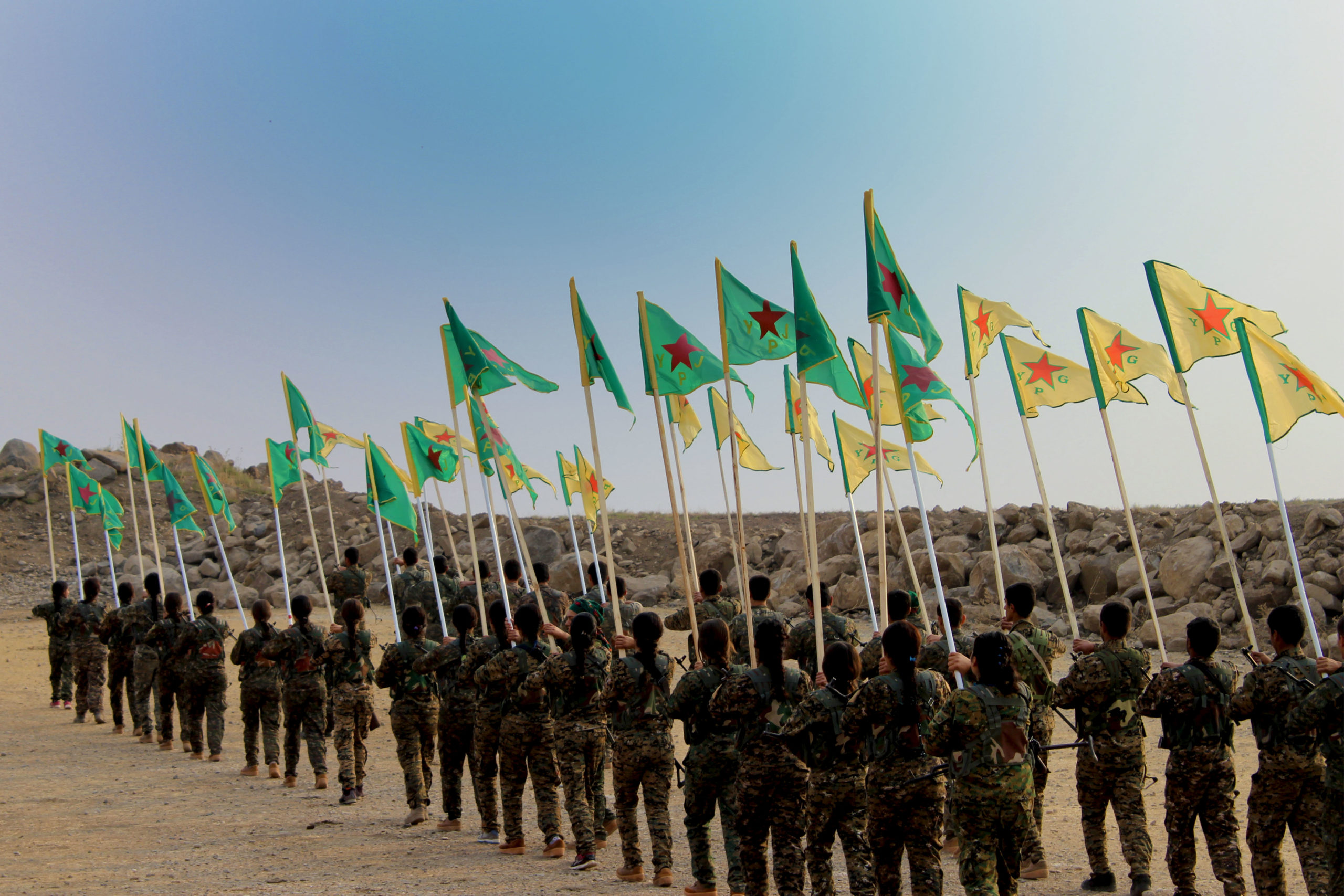
The imprisoned leader of the Kurdish freedom movement Abdullah Öcalan writes that capitalist modernity prevents us from asking a fundamental question: “how to live?” Under the “ideological monopoly” of liberalism, we are sneered at, ostracised or violently put back in our place any time we try to resist the “universal rules” which hegemonise our lives.
As militants of the Rojava revolution – which began eight years ago today – we have the opportunity to transgress these rules, and seek new ways to live. But before we can begin to seek an answer to Öcalan’s question, we must ask ourselves another: “how do I feel?”
The freedom of checkpoints.
Towards the end of my time in the West, this question was easy for me to answer. I woke up feeling quite bad; then at some point I had a drink; then another; then I started to feel good; then very good; then at some point – bliss – I felt nothing any more.
Alcohol dependency is one blunt example of a broader set of cultural, social, economic and – especially – patriarchal practices which limit the emotions we are able or permitted to feel. Love between a man and a woman must be lust; we must feel happy when with our family; we must be greedy with our time and resources if we are to pay the rent. We must drink to feel good: we must feel good, we’re drunk.
Of course, the same state-capitalist global hegemony affects our mood here too in North and East Syria (the formal name for the autonomous regions still better-known by the Kurdish synecdoche Rojava). It still surrounds us, still stands tall in the public consciousness and stalks through the cities here, still fuels the nightmares and daydreams of local people and international militants alike. But here, I and others have found new space to feel.
Jineology, the easy-to-grasp but hard-to-practice “science of women” founded by Öcalan and studied and practiced in academies across Rojava, places great value on subjective experience, irreducible to objective assessment. Practicing criticism and self-criticism, we learn to criticise our comrades not just for failing to do the washing up, but for their mood as they do the dishes; for the atmosphere they create as they walk in a room; for their failure to articulate their own emotions to their comrades. We consider emotion not as localised in the individual, but as something shared between us in our communal life.
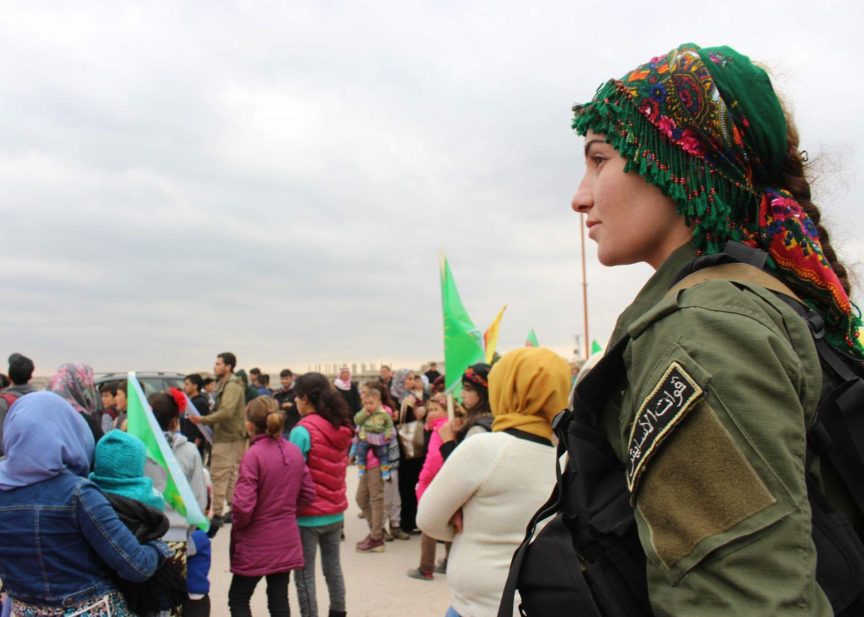
For me, this process has sometimes been as simple as noting the impact of other factors on my mood which I was numbed to in the West. There, I mocked the idea that diet could make any real impact on my mood, one good meal not making any real dent in the amphetamine onslaught that invariably followed. Here I have learned, among other revelations, what a difference is made by an unlooked-for egg in the morning.
Other emotions are harder to grasp, easier to fumble. As militants of this revolution, we are encouraged to ‘give meaning’ to the minutiae of life, to remind ourselves that tens of thousands of our comrades died to make our life here possible. We should grant revolutionary significance to our life in its smallest details, from the morning egg to cleaning the toilet to the way we use our free time.
Such an emotional response is not to be achieved through effort of will alone. If the word ‘martyr’ is too quickly invoked, as it sometimes is here, it ends up feeling cheap. This is an error many new international militants make, which I made, striving to imbue our toothpaste with the mystical value of the blood of ten thousand martyrs.
Our toothpaste, like all our groceries, is delivered by a logistics truck, making weekly rounds of the civil institutions to bring us our daily essentials, just as it would if we were on the frontline in Deir ez-Zor. This system does away with some of the stress attendant to the wage-relation in the West – fuck, I’ll never make it to the supermarket before it closes; fuck, my card’s declined; fuck, I forgot to buy toothpaste – time-consuming, psychologically taxing, above all boring. It is an alteration to the baseline reality of experience, opening new space in which to think, share and feel.
So the toothpaste does have special meaning: but only in relation to our comrades driving the logistic truck and keeping the supply-lines into Rojava open despite the Turkish-enforced embargo, sometimes, yes, at the cost of their lives.
Likewise, it is easy here to indulge in grandiose moments of emotional grandstanding – the manful sniff of the air on the earthwork berm overlooking a pile of dead Isis fighters, the pose struck in the mirror late at night in borrowed combat trousers, the whole People’s Protection Units/Women’s Protection Units (YPG/YPJ) fantasy as indulged in by movie-producers and Western anarchists who know nothing of what these things cost.
Such emotions – freedom, pride, honour – are indeed in the air here, but they are not to be found so cheaply, on such an individual basis.
Take freedom, for example. Rather than the sports car on the open road of American fantasy, here one feels free because one knows there will always be a lift, because if I need to travel from Qamishlo to Kobane for my work I can present myself at the nearest checkpoint and hitch rides from comrade to comrade until I reach my destination, with smiles and small-talk and cups of chai all the way, because our comrades are everywhere, manning all the checkpoints.
It is not the solipsistic moments snatched from some imagined future biopic which are important, I want to say, but those where one feels part of a great network of solidarity expanding out in time and space.
On the abstract level, I have never managed to give the same ‘meaning’ to a cup of chai tea here as I would to my first beer of the day in England: my failing, perhaps. But then I think of the chai shared with old friends as our paths crossed unexpectedly in a house near the border, with the Turkish invasion expected to break upon us any day; of the stories we swapped like gifts, each not expecting to see the other whole again; of the extra hour we snatched together as the beans proved slow to come to the boil on the hob, and how precious those moments were.
Statehood and sensibility.
Such moments are not only the result of changes in the fabric of society instigated by the Kurdish freedom movement under the umbrella of the Rojava revolution. They also emerge from the local culture of warmth, camaraderie and hospitality. Such characteristics are assigned to almost every culture outside the imperial core by travel-agents and travel-writers: pace Öcalan, the backpackers’ cliché has its truth.
5,000 years ago, Öcalan writes, people lived communally in small egalitarian communities not yet torn apart by the masculine ego which finds its greatest expression in the nation-state. Öcalan sees remnants of this ‘jiyana komînal’ – communal life – in the villages of Kurdistan and rural regions of the Global South more generally, and argues for its restoration into our desiccated society.
These values structure the work being done to restructure society in Rojava, not only as basis and aspiration, but also as necessary condition. You cannot ask for directions without someone clambering into the car to see you to your destination, nor stop off at someone’s house without being press-ganged into staying the night.
Here we arrive at an important question. North and East Syria is full of international militants feeling complicated feelings – and writing about them online. But what about the ordinary local people? How do they feel? How does state capitalism – and the attempts to shake it off now underway here – mitigate their emotions?
It’s not a question which can be answered in a few words. Broadly speaking, the public mood here is sentimental, in all the contrariness of the term: sickly sweets, oversized plush toys, bad phone graphics of hearts and roses, impassioned bouts of tears over matters trivial and life-altering alike (fingers fluttering at the breast and tongue ululating in the throat), fierce and overweening love of one’s land, courtship, blood feuds, veneration of martyrs, the elasticisation of the term ‘martyr’ to cover those dead by disease or road accidents, attachment to causes larger than oneself, militarism (pure sentimentality), idolisation of the family, swift empathy with strangers, shame, dignity. Lives spent swimming in a warm bath of emotions, like organs bathing in interstitial fluid.
An abundance of feeling is more present in society here than in the West, but constrained, mitigated and distorted by deep-rooted patriarchy (the blood feuds), the steady creep of capitalism (the plush toys), and war. The weddings here used to last three days and the funerals a week, grandmothers have told me as we chain-smoke together on the sidelines of such festivities: now, the funerals last three days, the weddings just one.
Such observations are in line with Öcalan’s analysis, and applicable to many other societies outside of North and East Syria. But here, the general lessening of shared emotion was abrogated by the outbreak of the Rojava revolution.
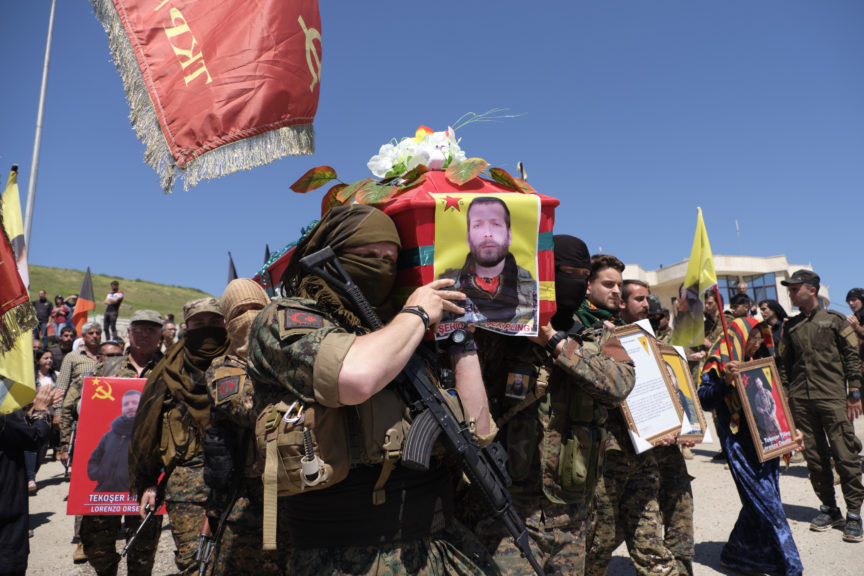
Exiting the state of exception.
There were few bullets fired on the night of 19 July 2012, as Syrian Arab Army units withdrew and the YPG entered Kobane. The price would be paid later, in running battles against the regime, the bitter campaign against Isis and other jihadist groups, and the ongoing struggle against Turkish occupation: but in those first hours, the major cities were seized without a fight. All that changed were the people manning the checkpoints, the flags over the squares, and the names of the cities.
Local people have told me of being moved to tears as they approached a checkpoint flying YPG colours for the first time, never having thought this day would come: ask any Kurd here how it feels to call their city by its Kurdish name. The emotional weight of that day is still felt here, even if it is forgotten in the West, with the people of Rojava constantly asked to prove anew their ‘right’ to dignity, freedom and self-determination, the hoops held out for them to jump through by liberal governments, anarchists and communists impossibly far apart.
Rojava’s would-be supporters may have forgotten this day: its enemies have not.
The philosopher Giorgio Agamben argues the capitalist nation-state achieves hegemony through the necessary and permanent exclusion of certain populations, voiding them of political agency and leaving them to live what he calls the “barren life” – Kurds in Turkey, migrants in Europe, women everywhere. The liberal state proscribes certain limits to its violence, only to suspend them in these ‘exceptional’ cases, which then become the new ordinary. “The rule, suspending itself, gives rise to the exception,” and whole populations are left to suffer under a permanent and increasingly global ‘state of emergency’.
Gassed in Iraq, executed in Iran, tortured in Syria, driven from burning villages in Turkey, the Kurdish people have learned the lesson of state violence. In many ways, Rojava prior to the revolution could have been a case study for Agamben – in Syria, the Kurdish people were written out of state politics to the point that hundreds of thousands of them were literally denied identity papers. Like Agamben, Öcalan came to believe that any state – however revolutionary in intention – would inevitably bring cruelty and oppression against the excluded minorities within its borders.
But what happens when the state takes the logical next step and literally withdraws from the unwanted border cities filled with easily-expendable Kurds? The Syrian Arab Republic spilled incredible amounts of blood to keep Arab-majority cities in its grasp: that it withdrew before a ragtag militia like the YPG perversely shows how little value it placed on the lives of its nominal citizens in the Kurdish regions. What happens when the state of exception consumes itself, and passes into statelessness altogether?
This question was answered by the Kurdish liberation movement in its Syrian manifestation, lean, hard and organised from long years of struggle, deeply-rooted in the villages and working-class neighbourhoods of Rojava. Following Öcalan’s thought on the nation-state, they refused the two obvious paths before them: neither bloody smash-and-grab expropriations of land in pursuit of centralised socialism, nor the establishment of an oil-rich client state like that across the border in the devolved Kurdistan Region of Iraq (KRI), Kurdish-nationalist in name, boot-licking in practice.
From the outset, the Autonomous Administration here has vocally expressed its desire to organise society in a different way, in a commune-based federation with as little top-down control as possible and guaranteed representation of minority communities. From the outset, the imperialist powers which variously besiege, invade, threaten, form alliances and negotiate with the autonomous region have refused to recognise it as such.
The people of North and East Syria, their political representatives in the Autonomous Administration and Syrian Democratic Council and their military representatives in the Syrian Democratic Forces are still typically referred to as ‘the Kurds’. This lazy shorthand elides the distinction between the KRI Peshmerga forces who fled and left the Yazidis to be slaughtered by Isis on Mount Sinjar, and the Kurdistan Workers’ Party (PKK) and YPG units which liberated the Yazidi people from ongoing genocide.
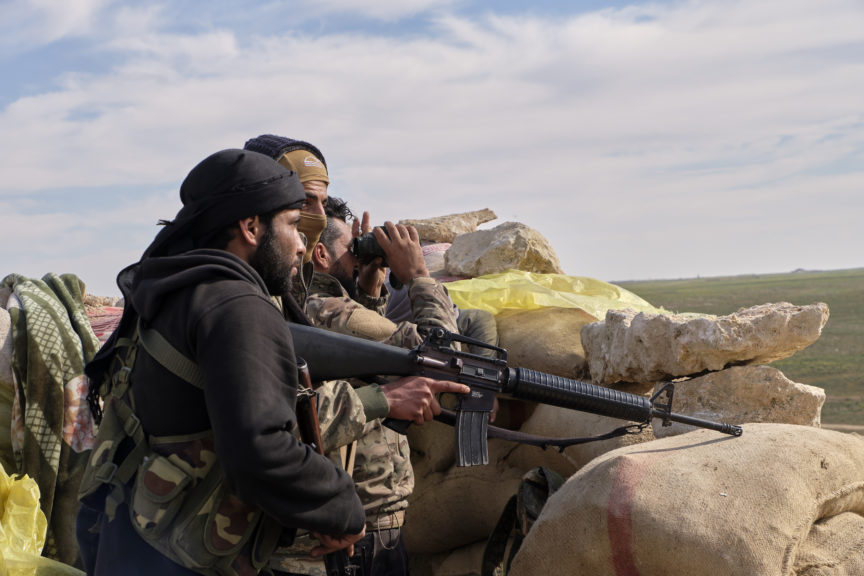
More importantly, the synecdoche indicates how hegemonic global powers are constantly seeking to press North and East Syria into ethno-nationalist form. The ‘Kurds’ are famous: they are good; they are secular; their men are brave and their women sexy; they are like us.
With millions of Arabs centered in cities like Raqqa, Manbij and Tabqa, sizeable Assyrian, Armenian and Chaldean minorities and small Turkmen and Chechen populations too, it is likely that Kurds do not even make up a majority of the population in the autonomous regions of North and East Syria. (Many would doubtless be shocked to realise that ‘the Kurds’, like the Arabs, are Sunni Muslims). But the world wants Rojava to be the new Kurdish state – it cannot understand what is happening here otherwise.
Likewise, the liberal press insists on understanding North and East Syria through a primarily-military lens. Following the bloody Turkish occupation of two border cities in October 2019, a tentative deal was reached with Damascus to bring Syrian Arab Army and Russian troops into position on the border to head off further Turkish attacks. Foreign correspondents fled overnight, pausing only to publish weepy op-eds about the “end of the revolution.”
They ignored what they were told by the authorities here, that the region retains its political, administrative and security autonomy: that every single checkpoint remains in our hands, that a change-over of flags along the border does not mean the undoing of all that has been won here in the last eight years. This misconception, repeated by radicals as well as the mainstream press, is borne of a wilful failure to understand the revolution here in its richness and fullness.
To this day, the US is pressuring the Kurds of North and East Syria to forge a union with the KRI, even as the KRI aids and abets Turkish war-crimes, even as the Syrian regime likewise attempts to buy the Kurds off with the promise of guaranteed language and cultural rights. Washington and Damascus alike want the Kurds to give up on their aim of multi-ethnic confederation, to reduce Rojava to just another ethno-nationalist project.
Through their refusal of the state form, the people of North and East Syria defiantly place themselves outside the biopolitical consensus, choosing to continue living bare lives without protection under international law. 11,000 dead in the defeat of Isis and the YPG, YPJ and Syrian Democratic Forces (SDF) are not invited to the negotiating table by the great powers, not even named, UN spokespeople instead alluding glibly to “our partners in the Middle East”. Like the Kurds under the regime, the people are denied identification.
Here, their names and photos are emblazoned on every wall: as far as the world is concerned, all those 11,000 sons and daughters are buried in the tomb of the unknown soldier.
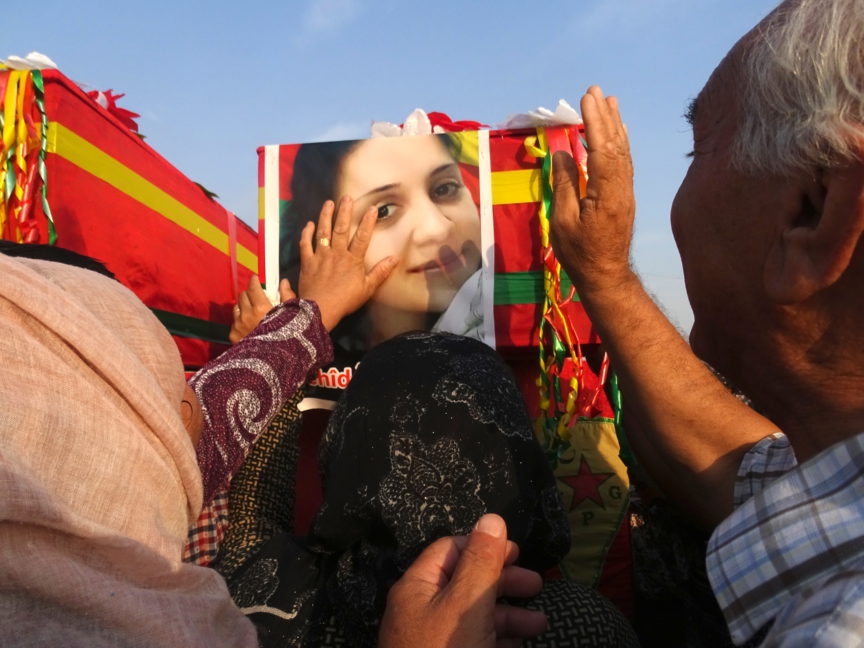
YPG iPhone cases and Isis amnesties.
No wonder people here experience lack, craving the security and comfort which statehood would bring. Those who do not engage with the structures of the Autonomous Administration keep their distance because participation leaves them feeling bare, exposed, outside the law. I have spoken to scores of people here who still chose to send their children to regime-backed universities, as opposed to the exam-free spaces of cooperative learning opened by the Autonomous Administration. Despite the slaughter of the last eight years, a qualification from the regime has infinitely more international legitimacy than those signed off by the Autonomous Administration, effectively worthless outside the autonomous regions.
The pressure to conform to statehood operates on all levels, from the concerned mother wanting what’s best for her children to the geopolitical decisions taken by the Autonomous Administration. In defending itself and its people, the revolutionary movement is necessarily forced to compromise, to take on state form. Such actions are often described with the Turkish loan word mêcbur – the same word you would use to describe the situation in a chess game where there is only one possible move to make.
Given the embargo, the smugglers and border traders must be allowed to continue their work so that medicine, cooking oil, sugar and other vital supplies can reach the people of Rojava: mêcbur. As such the economy remains capitalised, prices driven up by black-market Turkish goods. A friend has documented some of these knock-off efforts on Twitter, the ‘brands of Rojava’ bathetic in their failure to match up to the real thing.
The YPG-liveried iPhone cases and bootleg Starbucks in Kobane city center illustrate a larger point. This revolution is at its weakest in its moments of dewletbûn, or becoming-a-state, when conditions compel it to take on the form of the state it can never be. Instances of dewletbûn range from the bathetic (the short-lived cooperative which tried in vain to introduce ‘Rojava Cola’ as an alternative to the omnipresent Pepsi) to the troubling (training courses on how to run detention centers delivered by the American intelligence services.) These efforts, too, leave one with a sense of lack, an unfulfillable desire for the security and power of statehood.
Conversely, the revolution is at its most vital when it does not try to recoup these qualities, but goes its own way, achieving affects more vital and profound, more difficult to articulate to the West.
The defeat of Isis necessitated a highly-disciplined, centrally-commanded fighting force: mêcbur. The emotion which unites ordinary Arabs, Kurds and others in the autonomous regions more than any other is hatred of the shared enemy Isis, and delight in their defeat. Here lurks that inevitable danger which Agamben and Öcalan both describe: the people inevitably coalescing against an enemy who admittedly did everything possible to put themselves outside the law.
Yet there is another form of pride present here also, in how well captured Isis fighters are treated, in distinction to both Isis’ own practices and those of the nation-states who spent billions to bomb the caliphate into ruins only to cut off all support as the bombs stopped falling. It is in these moments, when you meet the 20-year-old Kurdish woman responsible for a camp of Isis detainees, loved by them and loving them though three of her family were slaughtered in Kobane, that you can see a way forward out of the mêcbur mess we are in.
Such efforts to do things differently, the education programs for Isis prisoners and women’s houses in the refugee camps and managed releases of convicted Isis members back to their tribes, have largely been ignored in the West. It is the Western pundits who clamour bloodthirstily for Isis fighters to be executed or left to fester in desert camps, and the Autonomous Administration here which waives its hard-won right to revenge.
In their refusal to exercise violence against captured Isis members, the autonomous regions step back from statehood as it is inevitably understood in this region. Rojava can never be a state – if it were to start trying and sentencing international Isis members, its judgements would be not recognised by international law anyway – and nor should it try to be.
Choosing without a choice.
By articulating the unavoidable mêcbur move as though it were a choice, the people here have found a way to fill this lack. More than a defence mechanism, this constitutes a reclamation of selfhood. When Isis closed in on Kobane and Turkey lined its tanks on the border to block the only way out, there was no option save a seemingly-hopeless resistance: but our comrades fought as though there was a choice, proudly, freely, in a resistance which won them global support and turned the tide of the war.
Or, as political leader Saleh Muslim said last year when Trump first announced his intention to withdraw from North and East Syria, flinging the door wide open to a Turkish invasion: “We did not call the Americans here, and we are not sending them away […] We won’t beg anyone not to attack us, or beg to be protected. We are here. We can handle our own defence.” A total lack of control over the capitalist and material forces pressing in on all sides becomes itself a point of pride, the people greeting their barren status with arms spread wide – and at this point zero, paradoxically, a space of resistance is opened in which humanity may be reclaimed.
Agamben typifies the last-ditch resistance of the barren life on the most individual scale possible, localised in the mortified bodies of Guantanamo Bay hunger strikers kept in permanent isolation. Members of the Kurdish freedom movement recently used the same method in Turkey, to win visitation rights for Öcalan following years of isolation. Their victory was achieved through what Agamben takes little account of, the international solidarity which saw hunger strikers from Canada to Wales to the villages of Rojava join Leyla Guven in her desperate death-struggle. Through their sympathetic participation, bodies spread far through space – and time – enabled the barren body in revolt to reclaim power outside itself.
More broadly, North and East Syria’s insistent presence outside the state – and specifically outside the Turkish state – is in itself an act of resistance. Per Agamben, the barren life is “at every instant exposed to an unconditional threat of death.” Here in North and East Syria, the people willingly put their bodies on the line, flooding in their thousands to ‘human shield’ protest camps on the border. It is easy for international observers to understand the crisis over North and East Syria as a matter of international horse-trading between imperialist powers, Turkey, America, Russia – but it is precisely the four million lives being lived here in Rojava which mean they can find no shareholder-pleasing accord, bringing NATO’s two largest armies to the brink of conflict.
In recent days, SDF forces have literally mediated between Russian and American patrols when they clashed on border roads in North and East Syria, in a striking image of the precarious dance in the space between imperialist powers which enables this region to retain its power. Rojava is playing Turkey against the US, the US against Russia, playing and being played, of course, but playing as best it can.
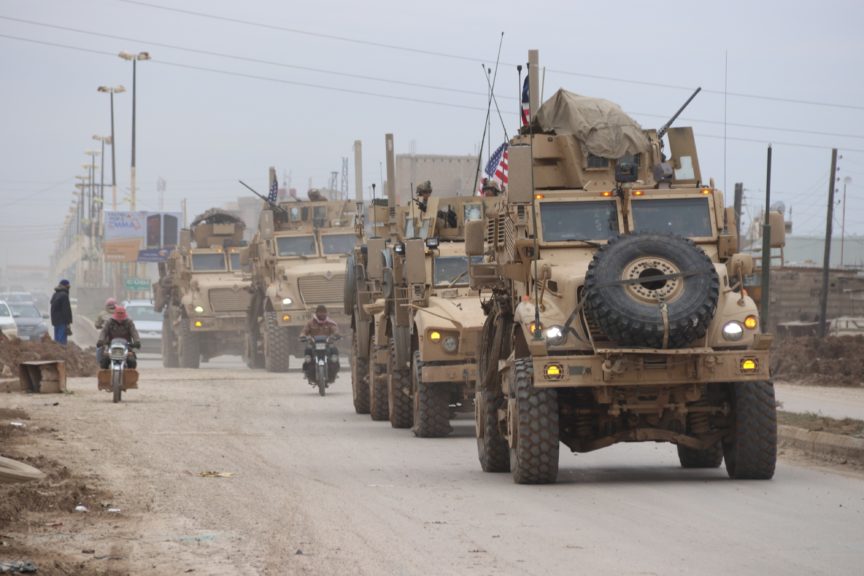
By excluding those four million lives from their power-plays for so long, the imperialist powers have granted them a power of their own. It was in their fragility that the people of Rojava found their strength. It was precisely because they lacked the apparent might of a state, devoid of heavy weapons, fighting without salaries or uniforms with rusty Kalashnikovs, fighting without a choice as though there was a choice, that the YPG and YPJ won international sympathy and support.
Driven outside of state structures, that old excess of emotion wells up through the gaps, reanimating dormant forms of kinship and solidarity all but written into myth back in the West – and drawing internationalist militants here to sacrifice their lives.
On a material level, those 60 international volunteers who lost their lives in the YPG and YPJ made no impact on the outcome of the war. The liberal press has been at a loss to understand why anyone from the comfortable West would throw their life away so lightly, lacking even the vocabulary to grasp such an act. ‘Volunteer fighters,’ they said, as though each of these militants did not feel in their separate ways an overwhelming need to travel here and join this revolution – as though it was not absolutely mêcbur. Speak to anyone here in Rojava who knew Anna Campbell, however, and you will understand that their sacrifice was worth everything.
To take another example, a friend of mine who worked in a film commune in the now-occupied border city of Sere Kaniye observed that for his young colleagues it is difficult to create new ideas, to dream, to hope – how can you start to really picture another world when the one around you might be wiped out tomorrow? At the same time, he said, many of these young women had to fight their families for months or years to be allowed out of the home to join the project. Their attendance at the commune, in a city right on the Turkish border, was in itself a victory. To turn up and do their work, to be alive, free and Kurdish, was itself an act of resistance.
The safe-zone where nothing is safe.
Following the military agreement between Damascus and the SDF and the temporary cessation of the Turkish advance, the same dialectic must be leveraged by Rojava’s political leadership. It remains to be seen if a real, political settlement with Damascus can be reached before Turkey continues its assault. With talks deadlocked, this sometimes seems impossible, and the civilians fear a third Turkish invasion will soon come.
But what Damascus values is military sovereignty and a photo of Bashar al-Assad on every wall, whereas what truly gives this revolution its value is not the photos of Öcalan but the great network of solidarity built on the basis of his ideas, the reconciliation committees and women’s houses and communes. The regime underestimates these structures at its peril – but it is in this disjuncture between how states understand power and how power is experienced here in Rojava that the space for continued resistance may be found, even within the context of a deal with Assad.
The principles of this revolution are most fully enacted in precisely those contexts where they are placed under most stress. In all my travels throughout North and East Syria, the most successful communes I have visited were those in the Kurdish refugee camps in Shebha, isolated and under embargo – because it is in such circumstances where principles of mutual aid are needed most.
So let Erdogan drive us south into the desert, as he has threatened – he will only strengthen the communal will to resist. Whether a settlement with Damascus is reached or not, what is certain is that what has been achieved here cannot be wiped away with the changing of a flag.
It is true that the people here are very tired, tired of war, tired of death, tired of not knowing when the next attack will come. Yet the last round of bombings and field executions and forcible demographic change made clear, once again, that Turkey will accept nothing less than the eradication of this project and this people in their entirety. As such, each life in Rojava is not merely “barren” but existentially, verdantly politicised. Ask any grandmother in Qamishlo – she will tell you they don’t know anything about politics, then talk about politics for hours. She will tell you that resistance was the milk on which they raised their children.
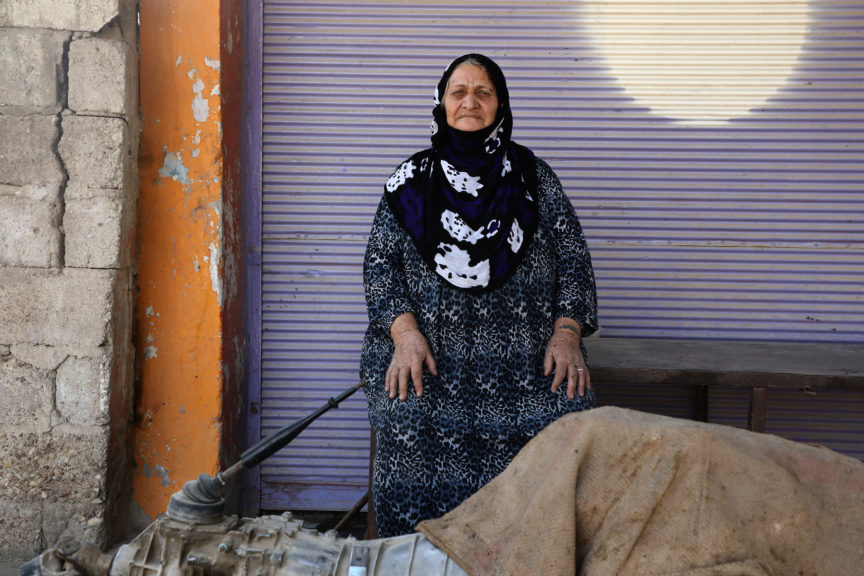
The fragile protest camps along the border were temporary, willed articulations of a permanent and unavoidable state of affairs. This remaining-in-one-place which itself constitutes an attack on the neo-Ottoman power to our north illustrates the ineluctable animating tensions of life in Rojava.
“We are here,” as Saleh Muslim said – depending on who is listening, it is both a war cry and a cry for peace. “Resistance is life,” runs the Kurdish slogan graffitied all over the border regions. This runs both ways as well: for the people of Rojava, life is necessarily resistance.
Here, in the safe-zone where nothing is safe; in the deconfliction zone where war is a constant reality; in Qamishlo souq where international militants cross paths with regime soldiers, each ignoring the other (unless you photograph their checkpoint, collapsing the fantasy of security, they and you becoming horribly present in the same place in one instant); here we can answer the riddling question posed by Öcalan, an obscure run-of-the-mill guerrilla when free, growing daily in strength and influence now he is captured and isolated on the prison island Imrali, for years kept in what one observer has called a “deafening silence.” It is only in this constant state of emergency that we know how to live, how to feel.
And so perhaps Rojava would have faced a more existential threat if things had been easier here, if Trump had not blundered into withdrawal and Turkey and their jihadist proxies had not soaked the cornfields of Sere Kaniye with blood. Perhaps the ill-defined ‘political status’ Rojava is seeking from indifferent Western powers would not be such a panacea after all, international capital rushing in before the ideas being rooted in the jineology academies truly have time to grow. It is at once harder and better to live in the permanent state of exception, where strong, clear emotions – love for the people, hate for their enemies – are easy to find.
Matt Broomfield is a journalist, poet and activist who has been living and working in Rojava for the last two years.